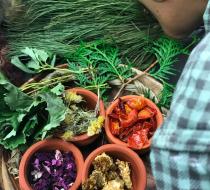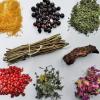Indigenous Cooking 2 Favorite
"a dinner cooked by six indigenous chefs, members of tribes from around North America, who are meeting together for the first time this week to launch a new indigenous activist group, called the I-Collective. Thursday’s dinner will be at Dimes, on Canal Street, and it will follow a dinner tonight for New York City’s local Native American community at the American Indian Community House, on Eldridge Street. On Friday, there will be an open-to-the-general-public tasting of Native food, cooked by I-Collective chefs at the prep kitchens of The Pixie and the Scout, on Bergen Street, in Crown Heights, Brooklyn.
“What we’re doing is rewriting history,” says M. Karlos Baca, one of the I-Collective organizers.The reason to rewrite history is that the story of Thanksgiving that we celebrate as a nation that pardons turkeys is on the one hand not true. The Pilgrims, just for instance, weren’t so much interested in religious freedom as setting up their own place away from anybody else’s religion. On the other hand, the story of America’s National Food Feast Day has served to vigorously whitewash the fact that Native people were systematically killed, that their land was taken away (treaty or no), that the settler colonists were working hard (and continue) to strip indigenous people of their culture—i.e., genocide. Meanwhile, Native people are not only not gone, despite what we tell our elementary school students, but thriving, and the kind of food activism that the I-Collective is starting up this week on Lenni-Lenape land is precisely what has been nurturing the tribal resilience that we see, for example, at places like Standing Rock.
Events like this Thursday’s pop-up dinner are meant to be a kind of intercultural experience, just by virtue of bodies at the table. “Just as some people have never met a New Yorker before, you can be sure there are New Yorkers who have met a Native person,” says Neftalí Durán. Durán is a chef and food educator who leads the Nuestra Comida Project at Nuestras Raices, in western Massachusetts, an organization that works to promote healthy environments and a more equitable food system in New England through education and food policy change. Durán lives in Holyoke, Massachusetts, but was born in Oaxaca, Mexico, and today practices Oaxacan culinary traditions. (He was the National Museum of the American Indian’s Native American Chef of the Year in 2014 and in 2015.)
On Tuesday night, members of the I-Collective were gathering for the first time, in the prep kitchens of The Pixie and the Scout. Brian Yazzie, aka Yazzie the Chef, who is Navajo from Dennehotso, Arizona, on the Navajo Nation, was just coming into town. He lives in St. Paul, Minnesota, and is the chef de cuisine at The Sioux Chef, one of the best-known indigenous kitchens in the country. (On his own, he caters, making meals free of colonial ingredients.) Other chefs include Hillel Echo-Hawk (Pawnee and Athabaskan), who is from Alaska where she was raised by the matriarchal chief and subsistence rights activist Katie John, and Brit Reed (Choctaw), who is the Seattle-based founder of Food Sovereignty Is Tribal Sovereignty, a Native-based activist group working in the Indigenous Food Revitalization Movement in the U.S. and Europe.
It is the very first time in New York—and the first time flying—for Frank Peralto, a Navajo (Diné) who was flying in from the Tohajiilee Indian Reservation, just west of Albuquerque, and for Shannon Dosela, who is a member of the San Carlos Apache Tribe, and lives on San Carlos reservation. Since getting a degree in culinary arts from the Le Cordon Bleu, Dosela cooks with the San Carlos Apache health care corporation and is honing his skills as a harvester of traditional Apache foods. David Rico came up from Washington, D.C., where, with a BA in the history of science, medicine, and public health from Yale, he works as a late night cook for Oyamel Cocina Mexicana and is a self-described failed rock star.
That half the chefs in the cooperative are women is not an accident, as the I-Collective sees itself as a platform to showcase young women chefs in particular. Iaonhawinon, who is Kaienkehaka and Mohawk, describes herself as “a dedicated hardworking chef-in-training from Akwesasne, Canada.” “We want to make a pitch for the female chef, the young chef,” says Durán.
The collective also sees itself as an event-maker that offers hosts of the dinners the chance to understand the state of Native America, and its history—to learn about seed keepers, and native food pathways—and this is the plan as the I-Collective proceeds to do subsequent pop-ups around the country and the world. “Going through this education process is as valuable as having a dinner, and in this way, we are creating the movement,” says Durán. “One of the most important things is that we are sitting down together and we are talking about things that don’t get talked about.”
It’s been an education, for instance, for Sabrina De Sousa, who owns Dimes and has been working to source foods for the chefs for weeks—chula buds, mesquite, tepary beans—and receiving mysterious packages. “I keep getting these boxes of things that sound like . . . beans?” she says, laughing with Baca. This was last night, in Crown Heights, as the chefs were arriving and prepping. Everything necessary arrived, as just a peek at the extensive menu attests: cushaw squash; rabbit with prickly pear, yucca fruit and bitter acorn; barrel cactus fruit; popped amaranth and epazote oil; cottonwood leaf–smoked quail; blue corn and bear root.
Baca foraged some of the many teas that will be served between courses on Thursday night, like cota tea, made from green thread flower. Baca, who is Tewa, Diné, and Nuche, is based in Colorado, though he has been traveling the country for months, cooking for native adults and children at schools, community centers, all over. “That’s how I think of myself,” he told me. “Not as chef Karlos Baca but as food activist Karlos Baca.” He also told me that the idea for the collective came up on the spur of the moment, he says. “When the universe wants something to happen, all the doors open instantaneously.”
Written by:ROBERT SULLIVAN









